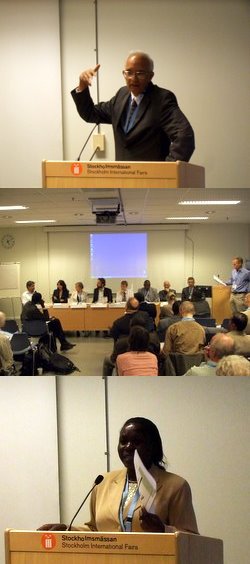|
| |
 Improve
Food Security - Combine Productive Sanitation, Conservation Agriculture and
Water Harvesting Improve
Food Security - Combine Productive Sanitation, Conservation Agriculture and
Water HarvestingSunday 17 August - Afternoon Seminar
(Content taken from the
World Water Week website)
Convenors: Food and Agriculture Organization of the
United Nations (FAO), German Agency for Technical Cooperation (GTZ),
International Fund for Agricultural Development (IFAD), International
Centre for Soil Fertility and Agricultural Development (IFDC),
International Water Management Institute (IWMI), Stockholm Environment
Institute (SEI), Swedish University of Agricultural Sciences (SLU),
United Nations Convention to Combat Desertifi cation (UNCCD) and
Sustainable Sanitation Alliance (SuSanA)
Event Summary and Conclusions
All speakers presented arguments why combining productive sanitation
with rain water harvesting and conservation agriculture will give large
synergies. This combination of good management practices has not been
tried at large scale yet, but many of us left the seminar with the
intention of implementing this combination.
Honorary Jennipher Byakatonda, Minister of State for Water, Uganda,
shared her experience from southwestern Uganda, where they know that the
fertilizing effect of urine is large. Yield increase is three times.
Director Maimbu Malesu continued that the World Agroforestry Centre,
ICRAF, is working on rain water harvesting, productive sanitation and
conservation agriculture in different projects. ICRAF now wants to
combine these features. Laurent Stravato informed that IFAD, in
cooperation with CREPA and SEI, will investigate the impact of
productive sanitation on the agricultural productivity and livelihood of
poor households in Niger.
Executive Secretary Luc Gnacadja, UNCCD, pointed out that the geography
of hunger and poverty coincides with that of degraded lands and that
degraded lands fixates less carbon. To improve livelihoods in Sub
Saharan Africa we have to improve, not degrade, the land. Simultaneously
this will counteract climate change. Professor Rattan Lal, State
University of Ohio, continued by comparing soil to a bank account. If
you take out more than you put in, the productivity goes down. The soil
is degraded, and not even an elite variety crop will yield well. To
improve the soil, you have to put more in than you take out.
Dr. Moussa Bonzi, CREPA, pointed at productive sanitation as a way of
putting more into the soil. He shared with us the excellent yields which
urine fertilized crops produced in their experiments. Often their yields
were better than that of urea fertilized crops. The urine fertilized
crops were also well accepted by the consumers, Dr. Bonzi responded to a
direct question.
Seminar Programme 13:30-17:00, Room K22
Chair: Dr. Johan Rockström, Executive Director, SEI, Sweden
Co-Chair: Dr. Elisabeth von Münch, Director, Ecosan Programme, GTZ,
Germany
13:30 |
Welcome and Introduction
|
13:40 |
Visions: Enhanced Health and Food Security
Hon. J. Namuyangu Byakatonda, Minister of State for Water &
Environment, Uganda |
13:50 |
Challenges and Opportunities for Smallholder Farmers in Arid Zones
Executive Secretary Luc Gnacadja, Benin, UN Convention to Combat Desertification (UNCCD) |
14:00 |
Improving Small Scale Agriculture in a Changing Climate
Prof. Rattan Lal, College of Food, Agricultural and Environmental Science, Ohio State University, USA
|
14:20 |
Achieving Food Security and Accelerated Sanitation Coverage through Water Harvesting and Conservation Technologies: Case Examples from Sub-Saharan Africa
Director Maimbo Mabanga Malesu, World Agroforestry Centre (ICRAF), Kenya
|
14:40 |
Experiences and Opportunities for Human Excreta Fertilizers in Improving Small Scale Agriculture
Dr. Moussa Bonzi, Centre Regional Pour l’Eau Potable et l’Assainissement à Faible Coût (CREPA), Burkina Faso |
15:00 |
The SuSanA Working Group on Food Security and Productive Sanitation Systems and the New Triple-Green Project
Dr. Pay Drechsel, IWMI, Ghana |
15:25 |
Panel Discussion
Moderated by Dr. Johan Rockström, SEI
Panel: Prof. Rattan Lal (Ohio State University),
Dr. Malesu Maimbo (ICRAF), Dr. Håkan Jönsson (SEI/SLU), Mr. Laurent Stravato (IFAD), Dr. Marjatta Eilitta (IFDC),
Dr. Sacha Koo-Oshima (FAO), Dr. Robert Holmer (XU-PUVeP) and Mr. Prakash Kumar (SEI/UNICEF-India)
IFAD support to the Triple Green Approach
Laurent Stravato,
IFAD |
16:50 |
Summing Up |
17:00 |
Close of Seminar |
Important links:
| |
|